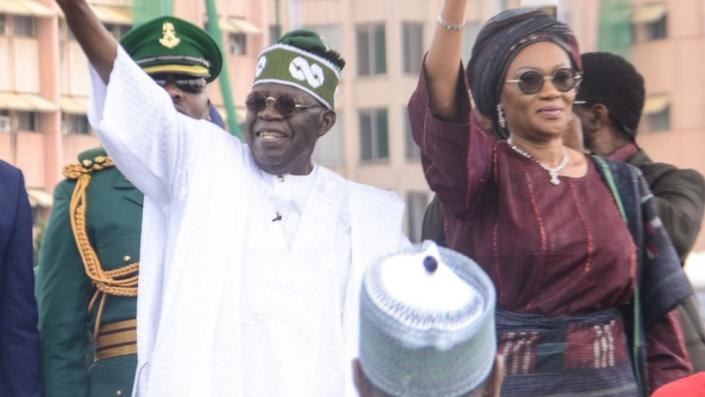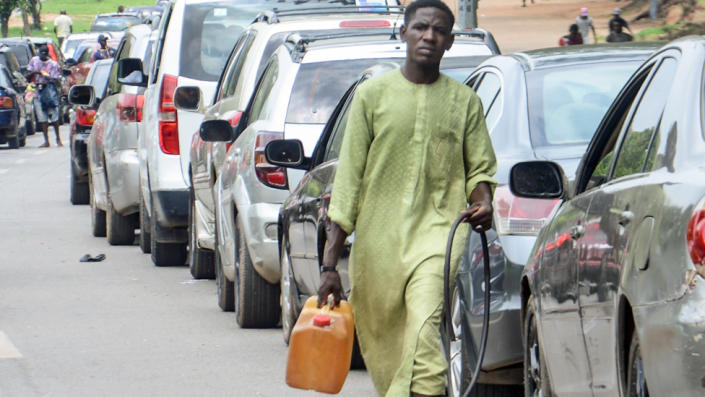
An off-the-cuff remark by Nigeria’s new president during his inaugural address has caused chaos with queues snaking across the country at petrol stations.
After being sworn in on Monday, Bola Tinubu took his eyes off the teleprompter during his address to say, “The fuel subsidy is gone.”
He was referring to a decades-long subsidy that helped keep the price of petroleum products low.
The 71-year-old politician gave no timeline or further details on what a major policy decision is. When a president last tried to scrap the subsidy 11 years ago, protests erupted.
Within hours of Mr. Tinubu’s first speech, hundreds of people had taken to the streets, either in their cars or on foot with yellow jerrycans, to collect what they believed to be the last drops of fuel to be sold in a price set by the government. .
But only a few were lucky – many gas stations stopped selling altogether, while others unilaterally raised prices by more than 200%, triggering chaos and an artificial shortage.
By the time the presidential team clarified that the subsidy cut would not take effect until the end of June – in line with the outgoing administration’s budget – it was too late to stop the panic.
On Wednesday, even the state oil company announced that it would raise the price of gasoline.
Transport fares have already skyrocketed, commuters are stuck at bus stops and the powerful union is now bracing for a showdown with the new government.
“By his callous decision on the day of his inauguration, President Tinubu brought tears and sorrow to millions of Nigerians instead of hope,” said Nigeria Labor Congress (NLC) leader Joe Ajaero, in a statement.
Despite its oil wealth, Nigeria is unable to refine crude locally to meet demand.
The four public refineries are moribund, forcing the country to import refined petroleum products which are then sold at a price set by the government.
So while people in the UK and Ghana, for example, paid £1.44 ($1.80) or 14 cedis ($1.24) respectively for a liter of petrol in May, Nigerians have paid 185 naira ($0.40) – although the three countries buy it at the same international market.
This has been the practice in Nigeria since the 1970s and most people grew up sheltered from the real price of petrol.

But Mr Tinubu says Nigeria can no longer do so due to falling revenues: the government has already set aside $7 billion to subsidize fuel for the first six months of this year.
This represents 15% of the budget, more than the combined allocations for education (8.2%) and health (5.3%).
Subsidies are not necessarily bad. Many countries offer them in sectors ranging from agriculture to electricity to reduce costs for citizens.
But the main concern of Nigerians is corruption. Government agencies give conflicting figures on the amount of fuel imported, while dodgy sellers have been known to divert fuel to neighboring countries to fetch higher tariffs.
Ironically, President Tinubu was leading the resistance in 2012 when a government last tried to end the subsidy.
He wrote then that the government had “thrown the people into the depths of the Midnight Sea”, in a virulent attack on the policy, which was subsequently reversed.
Yet there is more acceptance now that the subsidy should be scrapped to free up money for essential public services like transport, health and education.
Analysts expect the fuel to sell for between 250 Naira and 350 Naira after the current upheavals.
The increase may not seem huge, but it is likely to have far-reaching repercussions in a country where one in three people are unemployed, inflation is at a record 22% and 96 million live below the poverty line of $1.90 per day.
The situation is compounded by the fact that the economy relies on thousands of fuel-sucking generators that power businesses from hair salons to corporate skyscrapers due to a lack of electricity.
Nigerians already spend more than 60% of their income on food and transport. With the minimum wage stuck at $64 a month, many fear further impoverishment.
“It’s not sustainable,” mumbled a man at a petrol station in the capital, Abuja, after filling up his SUV.
Mr. Tinubu’s announcement was not preceded by the usual discussions with the unions to find common ground.
In late 2021, when the last government toyed with the idea, it offered a monthly cash advance of 5,000 naira to poor Nigerians to cover transport costs.

Many struggling Nigerians, accustomed to seeing politicians mismanage the country’s oil wealth, fear they are already victims of a profiteering racket.
They wonder why the price at the pump has already increased at private and public gas stations for what is likely older, cheaper stock.
They are also wondering what will happen to the money the government has set aside to subsidize fuel for the month of June. Will it disappear or will it be used for their benefit?
We get the feeling that politicians want people to make sacrifices without making any themselves.
“If the President had also announced cost-cutting measures from the government, such as the sale of a jet from the Presidential fleet or the reduction of the Aso Rock [a reference to the presidential office] budget on refreshments, the message might have been better received,” said another man at the Abuja gas station.
Nor was it the kind of day one statement that many expected from a president who lacks a large dose of goodwill – he was elected by less than 10% of registered voters.
Mr Tinubu is unlikely to reverse the policy. Unlike his predecessor, Muhammadu Buhari, who leaned towards welfarism, he favors free market forces.
Many Nigerians wanted Mr Tinubu to get down to business, but many would have liked him to stick to the script of his inaugural speech, which should have mentioned the “phasing out” of the petrol subsidy.

